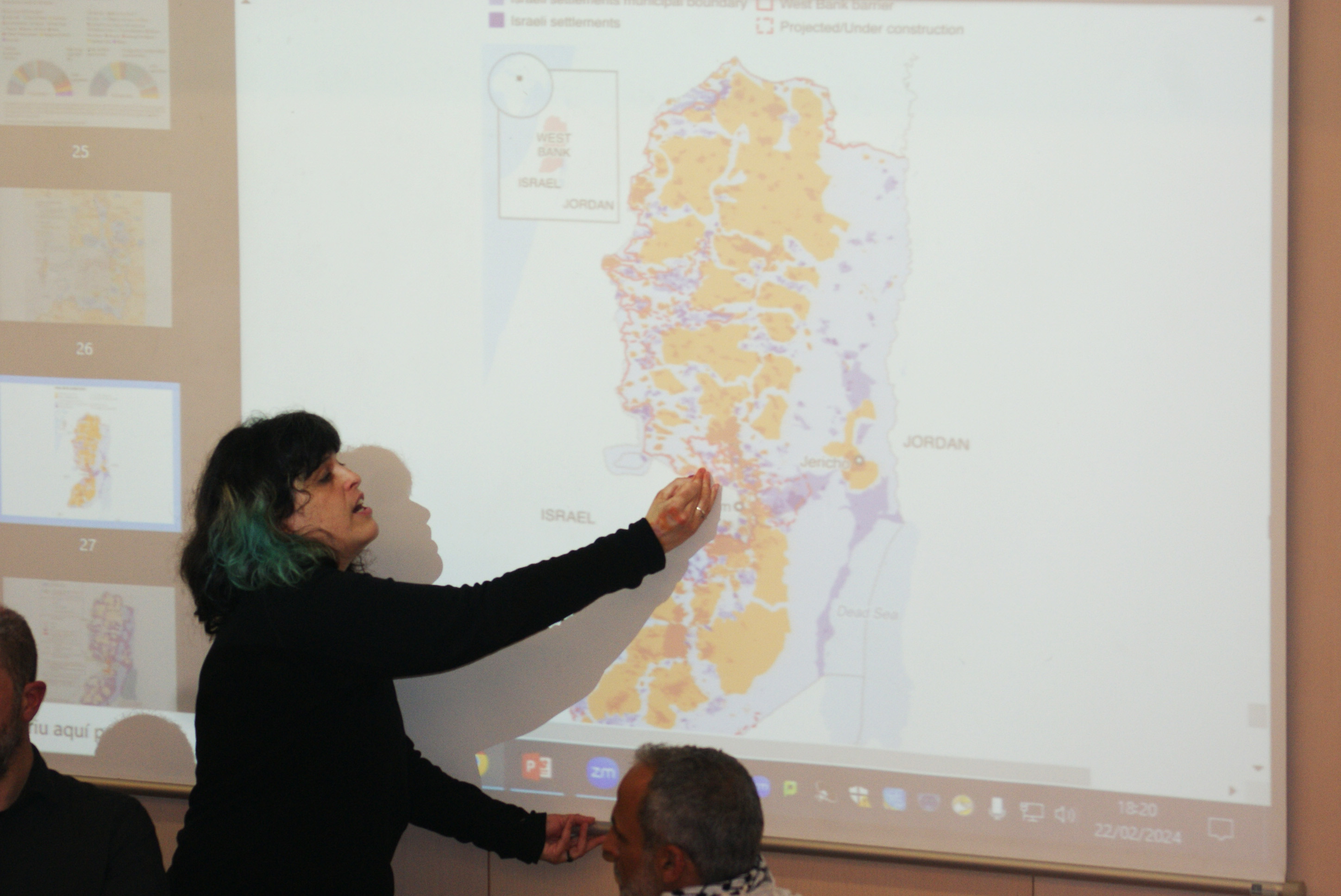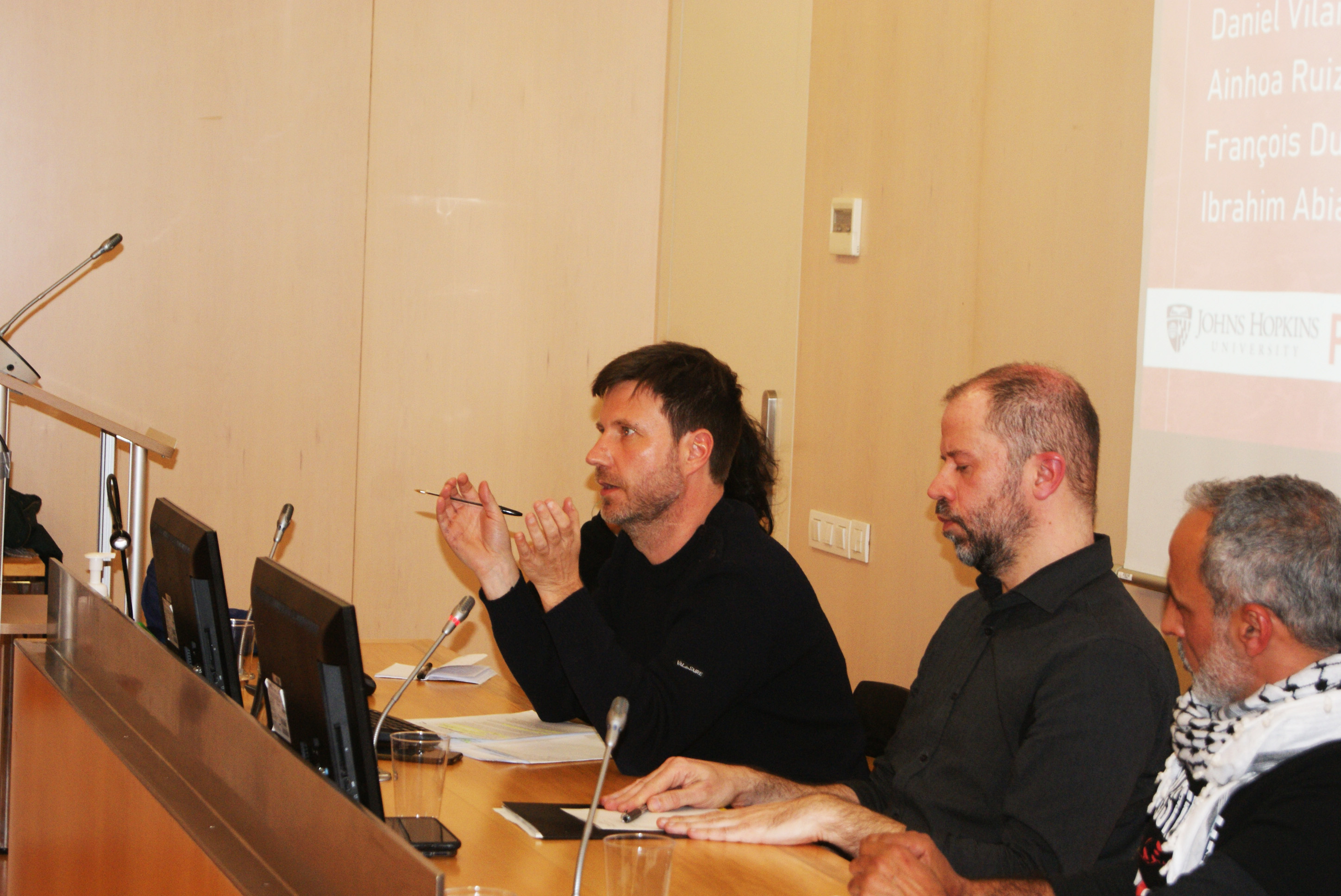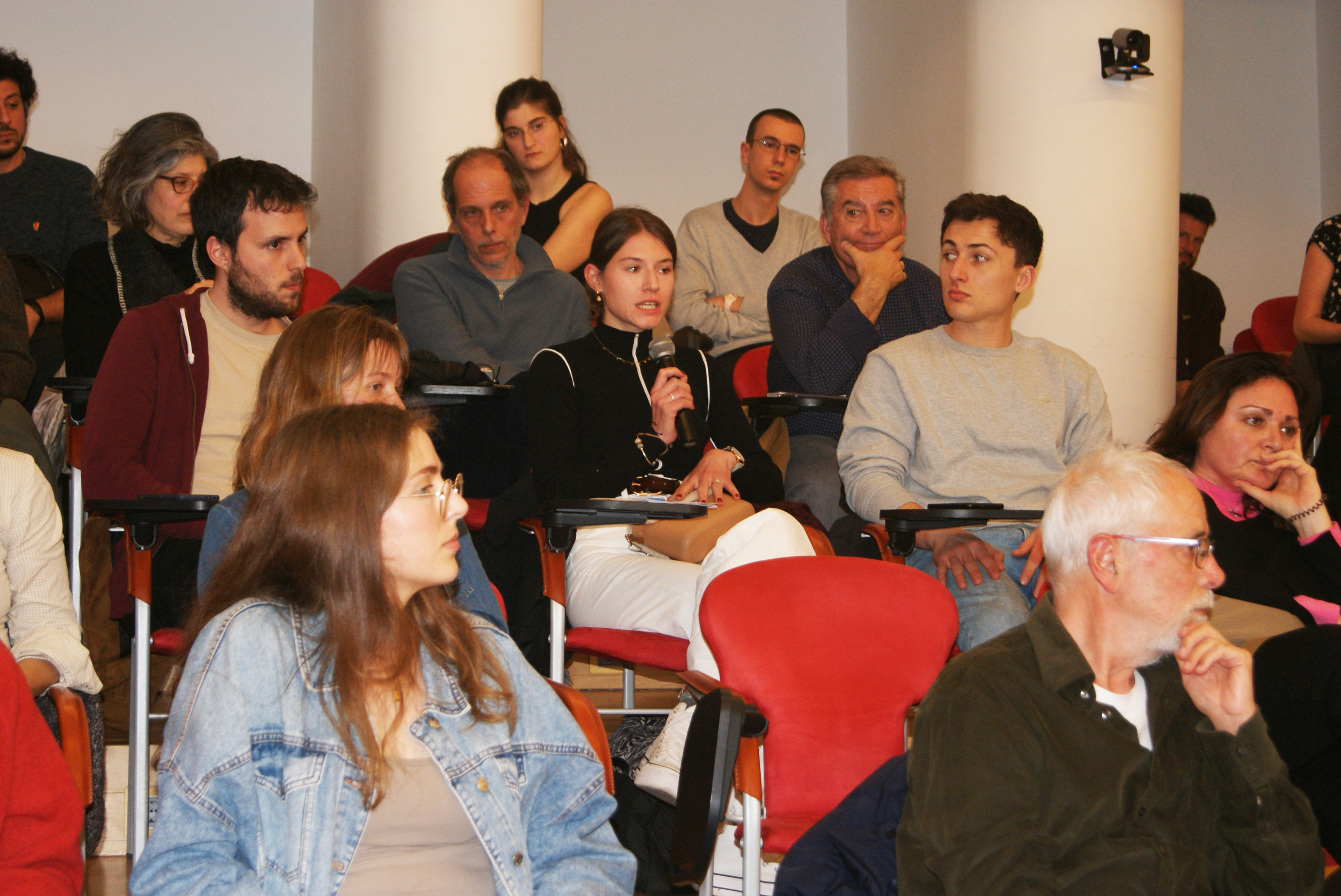“The Israeli armed forces have launched an indiscriminate attack against the civilian population in Gaza…they are making life impossible for them.” Report of the 16th edition of the Policy Dialogues series
“The Israeli armed forces have launched an indiscriminate attack against the civilian population in Gaza…they are making life impossible for them.” Report of the 16th edition of the Policy Dialogues series
In the 16th Policy Dialogues session, an in-depth discussion on the current crisis in Palestine/Israel took place. Speakers Daniel Vilaró, Ainhoa Ruiz Benedicto, François Dumont and Ibrahim Aviat provided a detailed contextualisation and analysis of the current situation at the humanitarian, political and military levels, emphasising the need to take urgent action to prevent a continuation of the unfolding catastrophe in Gaza.

The current military assault of the Israeli Defence Forces (IDF) in Gaza has unleashed a humanitarian crisis of devastating proportions, with massive loss of civilian life, forced displacement of entire communities and widespread destruction of basic infrastructure. In just 5 months, more than 31,000 Palestinians have been killed, including more than 12,000 children, who are the most vulnerable victims of this conflict, and more than 72,000 have been injured.* Indiscriminate shelling of residential areas, schools and hospitals, along with the imposition of blockades and restrictions on essential supplies such as food, water and electricity have plunged the population into despair: those who survive the direct violence are facing a deadly combination of malnutrition, dehydration and disease.
With over 85% of Gaza's population internally displaced and the health system collapsed, the crisis has been described as "apocalyptic" by the UN Human Rights Chief. The recent pronouncement by the International Court of Justice, which recognised that there is a plausible case of genocide being committed by Israel in Gaza, underscores the urgency and scale of this situation, in which civilians have been murdered at a rate unprecedented in the 21st Century.
In response to this emergency, the JHU-UPF Public Policy Center organised the 16th session of Policy Dialogues with the title "Palestine and Israel: Humanitarian Crisis, Human Rights and Pathways to Peace", with the objective of critically analysing the geopolitical, historical and military context of the territory, as well as the causes and consequences of the current conflict and humanitarian/political crisis.
The speakers were Daniel Vilaró, a journalist specialised in human rights and the head of communication and spokesperson of Amnesty International Catalonia; Ainhoa Ruiz Benedicto, Researcher at the Centre Delàs d'Estudis per la Pau (Delàs Centre of Peace Studies); Ibrahim Abiat, Representative of the Asociación Palestina Aragonesa (Aragonese Palestine Association), and François Dumont, Journalist and Communications Director of Doctors Without Borders Spain.
The session was opened by Daniel Vilaró, who addressed the complexity of the conflict in Palestine and Israel from the perspective of human rights and international law. Dividing his talk into three parts, he began by explaining the historical and political context of Palestine and Israel in general, stressing the importance of contextualising the current situation in Gaza.
Vilaró put emphasis on understanding the concept of occupation, and in particular, Israel's occupation of Palestine, arguing that this is fundamental for comprehending the current situation in Gaza and the Palestinians territories in general. He explained that this occupation, one of the longest and deadliest in contemporary history, has persisted for 57 years, in defiance of the principles of international law governing wars and the resulting occupations. International law states that an occupation must be of a temporary nature and that the occupier must administer the territory while respecting the rights of the local population. However, in the case of Palestine, the Israeli occupation is characterised by effective and total control over the territory, including the borders, the water and the daily life of the Palestinian inhabitants under its rule. He claimed ““The Israeli occupation is an inexhaustible source of human rights violations, which Amnesty International has been documenting”. Moreover, its duration (57 years) has extended far beyond the legally accepted “temporary” timeframe. Vilaró explained that an in-depth investigation into the political and humanitarian situation in the region led Amnesty International to denounce Israel for committing the crime of apartheid in 2022.
Vilaró then delved into the pivotal event of Hamas’ attack on October 7th 2023, and the consequences of Israel's protracted assault on Gaza in response to this attack. He pointed out that on numerous occasions, different international organisations (including Amnesty International) have condemned the Hamas attack, and he claimed that those responsible should be held accountable. He highlighted how Israel’s military assault triggered by this attack has further exacerbated the humanitarian crisis in Gaza, aggravating the already precarious conditions in which the Palestinian population of Gaza lived in recent years.
Finally, Vilaró explored possible solutions to the situation, focusing on issues related to international justice. He mentioned the process underway at the International Court of Justice, the relevance of the International Criminal Court for prosecuting individual war criminals, and the crucial role that the international community must play in the search for a just and lasting solution to the conflict. He ended his presentation by emphasising the need for an immediate ceasefire: "agreeing to this ceasefire must be immediate, because it would facilitate access to humanitarian aid, because it could be a key instrument to stop the suffering of the civilian population that we are witnessing on a daily basis".
The second speaker, Ainhoa Ruiz Benedicto, began her intervention by emphasising that the entire Palestinian-Israel situation described by Vilaró would not be possible without a powerful military machine behind it. She explained the theory of the military economic cycle, which makes it possible to analyse all the phases that make the execution of war possible: military spending and financing, the purchase and sale of armaments, the military industry, and the army itself, which is the entity that puts all of the armaments, technology and border militarization into use. Ruiz analysed Israel’s military industry and power in terms of each of these elements.
Ruiz emphasised that Israel's military spending in 2022 was $23 billion, much larger than that of its neighbours Iran (6.8 billion), Egypt ($4 billion), Lebanon ($4.7 billion) and Turkey ($10.61 billion), questioning the narrative that Israel feels threatened by the countries surrounding it. “Israel's military expenditure represents 4.5 percent of the country's GDP, this is well above the military spending of the world's most powerful military organisation, NATO”, Ruiz explained. She noted that Israel is among the top 15 countries with the highest military spending in the world and its military industry is one of the most powerful and famous in the world, as it sells its products with the “advantage” of having been “tested in combat” (meaning they have been tested in Palestinian territories or on Palestinians). She also highlighted the key role of other countries in maintaining Israel’s military complex, stating that this level of military spending is only possible because of the millions of dollars it makes through international trade of military equipment and technology. She noted that Israel exports three quarters of the armaments it produces, and “with this…it maintains an occupation that is tremendously expensive.”
Following this, Ruiz discussed the militarisation of Israeli society, explaining that in Israel, military service is compulsory for 3 years (refusing military service is punishable by prison). She argued that this process implicates the whole of Israeli society in the occupation, and normalises it for Israelis. She stated that compulsory military service is a key part of the militarisation of Israel’s society, mentioning that if an Israeli hasn’t gone through this process, they will face difficulties in life with things such as finding a job. Finally, Ruiz analysed the militarization of Israel’s borders and how it has become one of the most walled states in the world, with all of its 6 borders being "protected" by walls. She demonstrated how Israel has used the construction of walls and military surveillance systems to maintain the occupation of Palestine and control the movement of Palestinians, such as those living in Gaza who are unable to escape from the current bombardment.
The next speaker to take the floor was François Dumont. Dumont presented the current humanitarian and public health situation in Gaza, sharing testimonies directly from the territory, where his colleagues are working tirelessly in the midst of the crisis. He highlighted the critical situation that people are facing in the city of Rafah, in the south of the Gaza Strip, where more than 1.5 million people are currently taking refuge. He explained that approximately three-quarters of the Strip's population have been forcibly displaced and are living in constant fear of a potential ground offensive in Rafah, which has been threatened by the Israeli authorities. He expressed his horror at the suffering and indiscriminate violence perpetuated in the region, including that of the October 7 attack and that of the Israeli army and settlers in the Occupied Palestinian Territories.
Dumont continued his intervention with further accounts of the medical and humanitarian catastrophe that has been unfolding in Gaza. He shared a recent incident in which a shelter housing Doctors Without Borders colleagues and family members was hit by an Israeli tank shell. In addition, he highlighted the frequency of attacks on hospitals and medical centres by the Israeli military, as well as the arrests and murders of medical personnel and the destruction of emergency vehicles. He mentioned that Israel’s excuse for their attacks on hospitals is that Hamas is using them as military bases, and confirmed that at the time of speaking, there had been no independently verified evidence of this.
Dumont went on to point out the tragic reality of humanitarian action in Gaza, where Doctors Without Borders has faced numerous obstacles in providing medical assistance. Dumont lamented that, despite the efforts of humanitarian personnel, actual aid in Gaza is limited and often illusory. He highlighted the lack of hospital beds, medicines and supplies, underscoring the urgent need for broader and more effective interventions to address the humanitarian crisis in the region. He expressed concern that by failing to recognize the gravity of the situation and provide meaningful aid, the international community is contributing to normalising the suffering of the civilian population in Gaza.
Closing the presentations, Ibrahim Abiat spoke about his personal experience as a Palestinian, specifically during the siege of the Basilica of the Nativity in Bethlehem in 2002, the event which led to him becoming a refugee in Spain. Abiat, born in Bethlehem, described how the Israeli occupation deprived his community of basic supplies such as water, electricity, food and medicine during this siege, using strategies similar to those employed during the Nakba (Catastrophe) in 1948 to suffocate the Palestinian population and force them out of the region.
He recalled that, during this harsh siege, nearly 250 people, including the religious community, were trapped for days without access to humanitarian aid or the possibility of evacuation for the wounded. Abiat shared the pain of watching people die from wounds that under normal circumstances would not be life-threatening, as they waited for the possibility of being rescued by priests and nuns in the face of the Israeli army's relentless siege. He compared his experience during the siege with the current suffering in the Gaza Strip, whilst recognising the difference in scale, as both events highlight the brutality of the Israeli occupation, its continued violations of the human rights of Palestinians, and its devastating impact on their lives. He ended by sharing the current experience of his friends from Bethlehem who now live in the Gaza strip, some of whom have lost family members, and all of whom are displaced. They are living in a group of four families with children, in a tent of 2x6 metres, and they consider themselves lucky because that is the best option available in Gaza at the moment. Abiat expressed the feeling of impotence of Palestinians in the diaspora watching this suffering, and the frustration at the international community’s response to this massacre, which has been insufficient to stop it and has, in the case of some powerful countries, even continued to show support for Israel, despite the state being under investigation for committing genocide. He insisted on the urgency of ending the suffering of the Palestinian people with a lasting political solution.
The session concluded with a round of Q&As, in which the participants posed questions about the causes of the conflict, possible ways to confront the crisis, whether it is possible to confront Israel's military strategy, the functioning and structure of the UN in these conflicts, and what citizen actions should be taken to put a definitive stop to the violence, among others.
*Data correct as of 11/03/2024.


